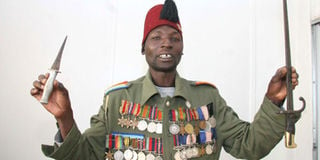Old fails to turn into gold for war veteran’s family

Amos Malui, an Eldoret town resident displays a French Napoleon sword (right) dates 1875, a German dagger, a jacked with several medals pinned on it, left behind by his grandfather who fought in the First and Second World Wars. He preserved the artefacts as part of history the family owns. Photo/JARED NYATAYA
When Mzee (old man) Lucas Odhiambo started collecting artefacts during World War II, people dismissed him, saying he was wasting time.
Indeed at the time, it would easily be misconstrued: What value was a kept coin compared to one spent on food?
The criticism, though, did not deter Mzee Odhiambo as he knew exactly that he wanted to form part of a rich history for his family and future generations.
Mzee Odhiambo may be long gone, but his grandchildren are now reaping from the effort.
Thirty-four years
Thirty-four years down the line, the venture is bearing fruit. Scores of people, including academicians, throng their Langas home in Eldoret to learn about some of the oldest artefacts.
“The collection means a lot to our lives. So far, we’re not willing to dispose of them despite the lucrative offers we receive from prospective buyers.
“Some leading scholars have come knocking,” says 29-year-old Amos Malui, Mzee Odhiambo’s grandson, who is the custodian of the artefacts. Mr Malui was nominated by his family members to take care of the collection.
Mzee Odhiambo’s fame dates back to his participation in the Second World War, which earned him recognition and the chance to wine and dine with the high and mighty, including Queen Elizabeth II.
His determination and courage in the battlefield earned him elevation to the rank of Field Marshall in the then Kings African Rifles. He was decorated with various medals and honours which he safely kept.
Among the artefacts Mzee Odhiambo left behind are currencies of various countries, postage stamps and weaponry — materials dating back more than a century.
According to Mr Muli, his grandfather fought against the German allied forces in Burma among other countries.
He was awarded various medals of recognition, which he kept in a pot at their Mutumbu Village in Gem Location, Siaya District after retiring from the forces.
The artefacts were moved to Eldoret three years ago for safe custody at Mr Malui’s farm. None of the valuables has been lost since they were handed over 30 years ago.
“The items have formed part of our inheritance. I was made the custodian with hope that one day they would elevate us from rags to riches,” Mr Malui said.
Notable items include Italian currency bearing the portrait of its former dictator Benito Mussolini, the common East Africa Community currencies and postage stamps and hand-driven grinding machines.
But what they thought was a blessing has turned to be a nightmare; they are tired of storing the artefacts.
Mr Malui says his grandfather strongly believed the artefacts would one day help them overcome the vicious cycle of poverty.
He says the family’s initial plan was to set up an exhibition centre, but the dream hit a snag after they failed to raise enough money.
“We do not have enough room to exhibit the medals and other valuables to visitors. It is our appeal to well-wishers to help us set up a showroom where the historical materials can be displayed for learning,” explains Mr Malui.
When the Nation visited the home on the outskirts of Eldoret Town, it appeared as a real museum.
In the two room house are three large wooden boxes full of artefacts, some ranging from colonial times to post-independence period.
Mr Malui regrets that the precious commodities might go to waste as they are of less value to the family members alone.
“The precious collections are of no value to us as we cannot generate any income from it,” said Mr Malui, a father of two.
“We’re ignorant about the market value of virtually all of these commodities. We’ve made several pleas to experts from the National Museums to sensitise us on the value, but the response has remained lukewarm,” Mr Malui says.
The family had even approached the Ministry of Heritage officials on what to do with the artefacts, but the feedback has equally been disappointing.
“The ministry has remained silent, forcing us to use our small house as exhibition room for the public and academicians who come knocking,” Mr Malui says.
The family is contemplating selling the items, he says. He, however, maintains consultations are on to set the date and venue when the auction will be carried out in case the proposal is approved by all family members.
“Our dream seems to have been shattered. We desperately need money to maintain our extended family,” said Mr Mului’s elder brother Patrick Obi Malui.
But all is not lost and Mzee Odhiambo’s family members remain optimistic that one day the public will realise the value of the items.
Some of the scholars we interviewed appreciate the value of the artefacts and want the Government to help the family with preservation.
“The future generation might not recognise the importance of the artefacts unless the Government moves in and preserves them,” said Mr Samuel Kirui who teaches history at Chepkumia Secondary.
He wants the National Museums of Kenya to take over the responsibility of taking care of the artefacts from the family.




